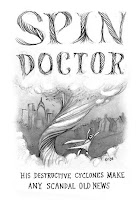Talk about simple strategic advisors seems simplistic, we then find out more about a figure of which the majority of people do not even know existed.
First, the term spin doctor was coined in 1984 by one of America's most famous journalists, William Safire, to mark the difference between the respective roles of the communicator (including spokesman and press secretary) and the ambiguity of new and unscrupulous public relations specialists applied to politics.
Modern spin theories are born at the beginning of 900: The American Ivy Lee, Edward Bernays, and Daniel Boorstin are the precursors, but from 1980 that these theories become the main instrument of communication, at least in the U.S. and Great Britain.
to inaugurate the new era was, in fact, U.S. President Ronald Reagan knew that, right away, that to govern effectively was to reduce the power of the press (then, after Vietnam War and Watergate in a position of extraordinary power over the political power). Reagan gave the image guru Michael Deaver and was immediately imitated by overseas Margaret Thatcher, inspired by Bernard Ingham. Their successors, both Republicans and Progressives, have traveled the same path: that of the spin, now indispensable given the current regular
 and the pace of political communication.
and the pace of political communication. But who really are the spin doctors and what they do?
sketching a translation we can say that "spin" means "to whirl" and "doctor" is understood as "the wise", "specialist". So the spin doctor is someone who knows how to give the news a particular cut, you know "twirl them around so wildly" hypnotized by the media, causing them to fall into a particular vision of reality.
Its natural habitat is represented by campaign, which plays the role of strategist and consultant to the side of the candidate. More sophisticated and persuasive techniques are propaganda, the higher the chances of victory at the polls. Are the spin doctors that: a show cause
- of electoral disputes;
- push the extreme techniques of disinformation and vilification of the opponent;
- process models focus more on image than on substance, encouraging politicians to lie.
the polls closed in most of Europe, the spin doctors went away or at least, are not of institutional mandates. The situation is different in the U.S. and Britain. And this is why the inclusion of spin in their thin fracture that divides the communication institution from policy.
The first is the "voice of the state", so it should be objective and neutral. The second, however, is by nature part of it is what allows the Head of Government or a minister to participate in public debate to defend their ideas and to provide interpretations.

The important thing is that everyone is put in a position to identify eqivoci without one or the other.
The spin doctors, by contrast, does everything possible to mix and confuse the two forms of communication. When called upon to assist a head of government does not act as "servant state", because that is not its function, but continues to defend and promote interests of their employer.
spin interprets the communication as a set of techniques designed to ' indoctrination of the public, regardless of what may be the common good.
As a good persuader is convinced that propaganda is really effective only when it is not easily recognizable. In fact, by using:
- a perfect understanding of the mechanisms that regulate the cycle of information
- the use of sophisticated psychological techniques , enabling him to influence the masses.
Although it is sometimes forced by circumstances to assume a public profile, he prefers to work behind the scenes, where it is most effective and this tends to blend.
becomes crucial, then, expose the technical spin if you do not want the liberal democratic societies lose what is their most precious asset: credibility . Finally
do is to take note of the illusion of " mediacrazia . Today, I am not sure of the media to influence political power, but it is to gear the information world.spin dynamics, however, does not affect only the journalists but the entire civil society. And when the general public, as John Stuart Mill argued, loses critical autonomy, democracy, while remaining such, it is emptied of meaning.
An exciting insight into the topic is the essay by Marcello Foa "Sorcerers of the news. From Kennedy to the war in Iraq: how to serve the government information factory." Publisher Guerini e Associati, 2006. Read it and you say: "I've seen things you people would not ...".
0 comments:
Post a Comment